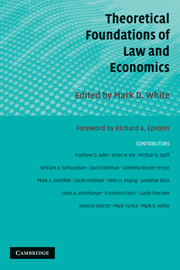Book contents
- Frontmatter
- Contents
- Foreword
- Preface
- Notes on Contributors
- PART ONE THE ROLE AND USE OF ECONOMICS IN LEGAL STUDIES
- PART TWO EFFICIENCY
- 5 Efficiency, Practices, and the Moral Point of View: Limits of Economic Interpretations of Law
- 6 Numeraire Illusion: The Final Demise of the Kaldor–Hicks Principle
- 7 Justice, Mercy, and Efficiency
- PART THREE RATIONALITY AND THE LAW
- PART FOUR VALUES AND ETHICS IN CIVIL AND CRIMINAL LAW
- Index
- References
7 - Justice, Mercy, and Efficiency
Published online by Cambridge University Press: 06 July 2009
- Frontmatter
- Contents
- Foreword
- Preface
- Notes on Contributors
- PART ONE THE ROLE AND USE OF ECONOMICS IN LEGAL STUDIES
- PART TWO EFFICIENCY
- 5 Efficiency, Practices, and the Moral Point of View: Limits of Economic Interpretations of Law
- 6 Numeraire Illusion: The Final Demise of the Kaldor–Hicks Principle
- 7 Justice, Mercy, and Efficiency
- PART THREE RATIONALITY AND THE LAW
- PART FOUR VALUES AND ETHICS IN CIVIL AND CRIMINAL LAW
- Index
- References
Summary
If one proposes to consider mercy and efficiency under the same heading, the aim surely must be to draw a contrast. For we associate mercy not only with leniency but with a fine sensitivity to circumstances and both the ability and the disposition to sympathize. No matter what the context in which we contemplate it, efficiency carries none of these associations. It requires no well-trained sensitivities or dispositions. These are time-consuming to develop and costly to employ. A mathematical formula, ready-to-hand and relatively simple to apply, much better suits efficiency's focus on savings.
This general division between mercy and efficiency carries over to their more specialized application in legal contexts. Here mercy urges attention to facts and circumstances that we might ignore if we focused solely on what strict justice requires or permits. It is, we might say, a virtuous disposition to leniency marked by a compassionate attention to the circumstances at hand. Efficiency, in its relatively recent incarnation as the guiding principle of the law-and-economics approach to legal interpretation, is perhaps best understood as a means of wealth maximization. Depending on the context, we can use standards including Pareto superiority, the Kaldor–Hicks test, and the Coase theorem to determine what legal standards, or interpretations, will yield the most substantial gains. The chief concern of the economic approach is to achieve Pareto-optimal outcomes, those in which no distributional change could increase utility for one party without decreasing it for another.
- Type
- Chapter
- Information
- Theoretical Foundations of Law and Economics , pp. 119 - 136Publisher: Cambridge University PressPrint publication year: 2008



